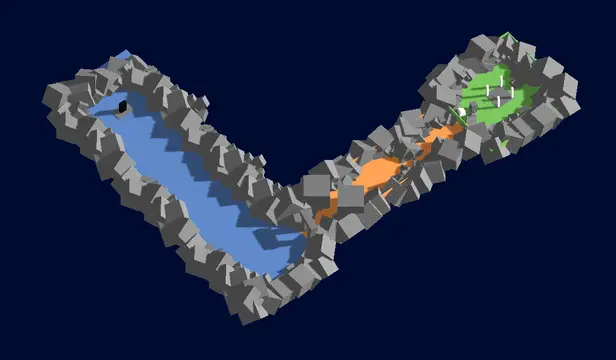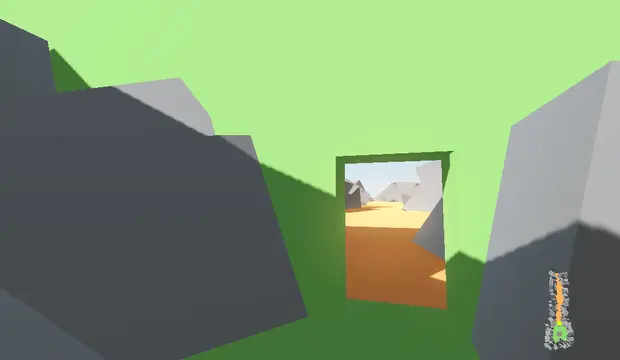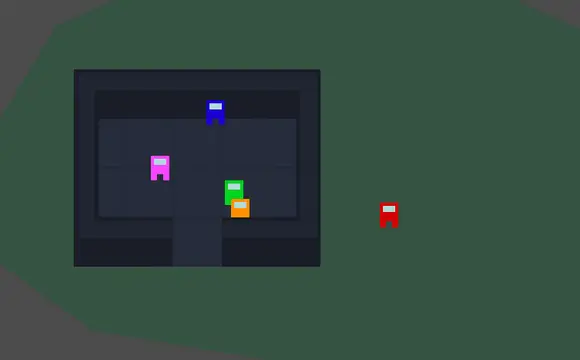Install Asset
Install via Godot
To maintain one source of truth, Godot Asset Library is just a mirror of the old asset library so you can download directly on Godot via the integrated asset library browser




Quick Information

This template shows you how your game can automatically load/unload zones according to your player position. By implementing this template in your game you can have a seamless world as big as needed, without loading screens.This works for both 2D games and 3D games, try the demo by executing this project.Note that it is not a chunk system based on distance to the player, if you need chunks loading for an open world, please check other solutions.You may leave feedback on the Github "Feedback" issue.Download the version on Github to get the latest changes.
Zone Loading System
This template shows you how your game can automatically load/unload zones according to your player position. By implementing this template in your game you can have a seamless world as big as needed, without loading screens.
This works for both 2D games and 3D games, try the demo by executing this project.
Note that it is not a chunk system based on distance to the player, if you need chunks loading for an open world, please check other solutions.

Pros
- Good if loading the whole world at once would take too much time/memory.
- Allows huge seamless worlds without loading screen.
- Works for 2D and 3D.
Cons
- Useless if your whole world can be quickly loaded in memory, or if you don't mind loading screens.
- Need to manually split the game world into zones and set triggers.
- In 3D, zones need to be carfully designed so that player cannot see unloaded zones (needs twists and turns or fog).
How does it work ?
The geometry/sprites of each zone sits inside an area node that should encompass all the zone geometry/sprites. The zones areas should be overlapping.
Rules:
- The player can be in one or more zones at the same time (player zone(s)).
- Zones overlapping the player zone(s) are automatically preloaded (loaded but not attached to the game tree).
- When the player enters a new zone, that zone is attached to the tree (made visible).
- When the player exits a zone, that zone is detached from the tree (invisible, but stays loaded).
- Zones not direcly overlapping the player zone(s) are unloaded (freed from memory).
- Zones are detached with a small delay (a few seconds) to prevent unnecessary work when player moves back and forth a small amount.
Background loading
All the loading and instancing is done by one background thread that runs parallel to the main game, so it should not create stutters, please check "background_loader.gd".
The thread is automatically started at the start of the game, and stopped at the end. Stopping the thread can take a few seconds if the thread is currently loading data.
Configure the player
- For 2D, add an Area2D to your player's camera with a collision shape covering the whole screen. This way zones will be loaded when they become visible on screen.
- For 3D, add an Area to your player's camera with a collision shape encompassing the player.
- Set the area's collision mask to "zone_triggers" (leave collision layer empty), this way the area will collide only with zone triggers.
- Assign your player scene to the world's "Player Scene" attribute, it will be automatically spawned on world load, at the location of a node in the group PLAYER_SPAWN.
Add a new zone
- Create a zone, save it as a separate scene.
- Create a new node under
World/ZoneLoader, name it with your zone name. - Attach the script
zone.gdto the node - Set the zone path in the inspector
- Click the checkbox "Preview" to make the zone visible
- Move the zone node where you want it to be relative to the other zones
- Add a new Area (or Area2D) node as child, name it
ZoneTrigger - Set the collision layer and mask to
zone_triggers - Add one or more collision shapes that encompasses the zone, the zone will be loaded when the player enters this area
Done. Now the zone will be loaded, instanced and attached to the tree automatically by the system.
Known issues
Stutter when a new zone is attached to the tree
- New shaders are being compiled. Limit the number of different shader you use and use a shader cache to precompile the shaders during loading screen.
- outputting to the console using print() and errors can create stutters.
Error: _body_enter_tree: Condition "!E" is true (fixed in Godot 3.4 beta 4!).
- Can happen when exiting and reentering a zone in 3D, this is a bug in Godot before 3.4 beta 4.
Objects/monsters are reset when going back
- You need to save your zone data when it is unloaded and restore it when the zone is loaded, it is not in the scope of this template.
Contribute
You can leave comments here: https://github.com/Yogoda/ZoneLoadingSystem/issues/3
You are free to submit issues, contribute and improve this template, this is a Creative Commons
Big thanks to rmvermeulen, Wrzlprnft and jbpuryear for their contributions!

This template shows you how your game can automatically load/unload zones according to your player position. By implementing this template in your game you can have a seamless world as big as needed, without loading screens.
This works for both 2D games and 3D games, try the demo by executing this project.
Note that it is not a chunk system based on distance to the player, if you need chunks loading for an open world, please check other solutions.
You may leave feedback on the Github "Feedback" issue.
Download the version on Github to get the latest changes.
Reviews
Quick Information

This template shows you how your game can automatically load/unload zones according to your player position. By implementing this template in your game you can have a seamless world as big as needed, without loading screens.This works for both 2D games and 3D games, try the demo by executing this project.Note that it is not a chunk system based on distance to the player, if you need chunks loading for an open world, please check other solutions.You may leave feedback on the Github "Feedback" issue.Download the version on Github to get the latest changes.
